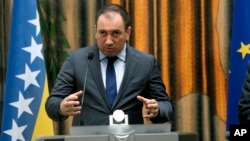Bosnia expects the European Union's foreign ministers to accept its membership application next week, the start of a long path towards joining that could yet be overshadowed by a Bosnian Serb referendum that threatens to expose deep ethnic divides.
The country, beset by economic woes, had an earlier attempt at gaining EU approval scuppered by arguments between its autonomous governments, set up 20 years ago to preserve the country's unity at the end of an ethnic war.
"I expect that we'll get a positive decision from the EU General Affairs Council simply because we have done everything that was expected from us," Foreign Minister Igor Crnadak told a news conference on Friday.
Cajoling the countries of the western Balkans along a path towards closer European integration is a major goal for the EU, which sees the promise of membership as a guarantor of peace in a region that is still scarred by the wars that followed the collapse of Yugoslavia in the early 1990s.
Bosnia filed its membership application in February, but the country's autonomous Serb Republic rejected key conditions imposed by Brussels, including the expansion of a trade deal with Croatia to cover the whole EU, which delayed approval.
Under pressure from the West, the Serbs relented in July, paving the way for the EU ministerial council to consider Bosnia's membership bid at its session on Tuesday.
The country, divided into Bosnian-Croatian and Serbian autonomous regions, remains deeply divided, a legacy that exacerbates the country's economic difficulties and poor investment climate.
Those divisions have been highlighted by the autonomous Serb Republic's plans to hold a referendum on celebrating a national day on Jan. 9, an Orthodox Christian holiday - a prospect that has angered the province's Catholic Croats and Muslim Bosniaks.
The country's highest court is expected to decide on Saturday whether to allow the vote. But the predominately Orthodox Serb Republic is likely to defy any ban, setting up another flashpoint.
Crnadak, himself a Bosnian Serb, said the referendum would not be an obstacle on Bosnia's EU path, adding that he hoped a way could be found of celebrating the Jan. 9 holiday legally.





